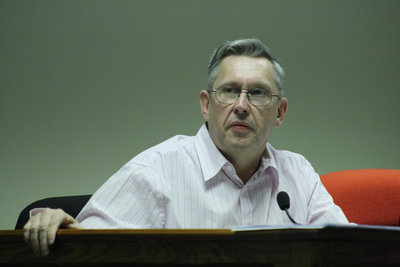Faced with a 75 percent cut in federal funding for its Work Force Development program, Hudson County Freeholders are seeking to revamp and make more efficient the programs that will help get people off welfare and into jobs
Freeholder Bill O’Dea grilled Work Force Investment Board Executive Director Anthony Corsi at the May 10 meeting, asking what strategies the board has taken to make up for the loss of federal funding. O’Dea also wanted to find out more about an annual luncheon that was designed to attract business and other leaders from around the county, with the possibility of getting them to sign onto a jobs program.
The Hudson County WIB is responsible for the planning, policy guidance, and oversight of the entire workforce development system, including the integration of the “welfare to work” programs with the two One Stop Career Centers – one in Union City, and the other in Jersey City. WIB has an overall goal to develop sustainable and integrated career information, employment, educational, and training services that can serve the needs of both residents and the business community.
Representatives of the private sector from major business organizations and economic development agencies are a majority of the WIB, and are its primary resource for determining labor market demands.
O’Dea, however, was critical of the luncheon that brought about 100 people as part of WIB’s effort to make the business community aware of its programs
“I would rather see a greater emphasis on the use of social media and the internet, and an outreach for businesses that is more person to person,” O’Dea said.
WIB lost almost $40,000 in federal funding from last year, and O’Dea said that he would like to see a better integration of services, including more interaction of the municipalities such as possibly connecting with Urban Enterprise Zone people in each community, as well as the economic development people. O’Dea said he would like this effort to include the expertise of the Hudson County Economic Development Corporation and possibly smaller events that take place in local communities.
O’Dea suggested that WIB might partner with local businesses that might help co-sponsor events where potential job-producing businesses might meet up,
Corsi said the luncheon last December, an event he had planned to repeat this year, did produce some job orders and training opportunities, but said WIB is also reaching out to groups such as Chamber of Commerce.
O’Dea said he would like to see a variety of job opportunities, saying that training and job creation might include office workers, blue collar workers and also hospitality services, noting that Jersey City and Secaucus have a significant number of hotels that might provide employment opportunities.
He also said WIB should be seeking out companies such as Goya and other Latino companies within Hudson County.
He said businesses and local colleges might help stretch WIB’s money by agreeing to host some of these job related events, and would go a long way toward integrating the community into these efforts.
Freeholder Chairman Elu Rivera said one of the county’s concerns is to find summer hiring and to raise funds for the county’s program addressing the younger population.
“I would rather see a greater emphasize on the use of social media and the internet, and an outreach for businesses that is more person to person.” – Bill O’Dea.
__________
County college, vo-tech agreed to labor projects
Trustees for Hudson County Community College have voted to include Project Labor Agreements (PLAs) in ongoing and future construction projects, after the freeholders threatened to not approve funding for the college’s capital improvements.
O’Dea said the trustees met on May 8 and agreed to abide by a model for including PLA’s that the freeholders established several years ago for its own departments, but because the college has its own board, the freeholders pressed the college to abide by the same rules.
A PLA requires all contractors, whether they are unionized or not, to subject themselves and their employees to unionization in order to work on a government-funded construction project. This is done by including a union collective bargaining agreement in a public construction project’s bid specifications.
PLAs have long been hailed as a tool to facilitate construction projects using contractors who employ qualified building trades. But opponents of PLAs claim such agreements increase the overall costs to projects and subject non-union workers to union control on these projects.
The freeholders are threatening to hold up nearly $7 million in bonding that would refinancing some of the college’s debt and more than $32 million in capital improvement funds unless the college implements the PLA.
“Not only will the college include Project Labor Agreements in its contracts,” O’Dea said. “But the Hudson County Schools of Technology have also agreed to do so.”
Freeholders allow use of county roads for bikes
A bicycle ride called Gran Fondo New York, slated for Sunday, May 20, is expected to get approval to use River Road in North Bergen, Guttenberg and West New York.
River Road is a county-controlled road, and the resolution was slated to be passed at the May 10 Hudson County Freeholder meeting. It would grant permission for the interstate event to traverse River Road from about 11 a.m. to about 5:30 p.m., and would also permit “reasonable” pre-start and post-end time.
The event is expected to draw up to about 5,000 cyclists from more than 70 countries and 47 states. The event starts at 7 a.m. on the George Washington Bridge and travels up to Bear Mountain. It will then reverse to the George Washington Bridge and cross into New Jersey, winding its way through Bergen County before entering Hudson County at North Bergen, Guttenberg, West New York, and Weehawken, and finishing at Port Imperial.
